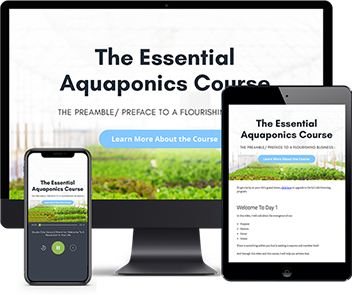The Preamble/ Preface to a Flourishing Business
The Food Produce is Contaminated Today!
The food produce is adulterated with chemical fertilizers and pesticides and is hazardous to the health of your close ones. insecticides and pesticides cause several adverse health effects which range form mild allergies, rashes, breathing difficulties, neurotoxicity and reprodutive abnormalities, disruption of the Endocrine System to deadly chornic diseases like cancer.
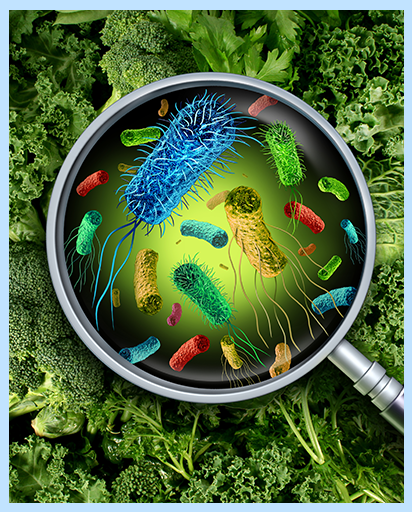
A Threat to Your Community’s health
Every nook and corner demands produce. Due to this, the intensive use of fertilisers, pesticides and fossil fuels to boost production is affecting the holistic health of your near and dear ones. Traditional farming methods are extremely taxing on farming as a profession and our ecosystem.
The CO2 emissions through conventional agriculture create a negative loop that dramatically impacts you as a farmer. The environment is becoming continually unstable and if you are a farmer who relies on the stability of the ecosystem for your crops, then it is time for you to switch to an alternative farming method that fosters food growth that is healthy, nutritious and wholesome.
Does your heart leap with joy with the thought of harvesting 100% chemical-free, organic produce for your family members? Therefore, it becomes crucial, that we can grow fruits and vegetables at any location we choose, regardless of the soil conditions or the environmental conditions and eliminate the usage of chemicals completely.

The Need to Make Farming Profitable.
Traditional Agriculture or Farming practices are dependent on external conditions to ensure profitability. As the variables in question seem to alter continually on an annual basis, it becomes vital to find a solution to make farming a profitable profession. As the environment continues to destabilize each year, traditional agriculture has less reliable as time passes.
The dependence on rainfall, sunlight and stable ecosystems has become unsustainable and this is taking a toll on produce created by farmers each year. Are you looking for a flexible, inexpensive and long sustaining farming method that completely eliminates reliance on water, soil and other resources of Mother Earth?

A Boon in Disguise An Ideal Solution for Modern Farmers
Welcome to the sustainable balance of Aquaponics, which is the shining star in the arena of sustainable farming.
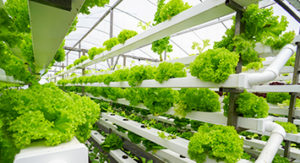
What is Aquaponics?
Aquaponics is the system of farming plants and fish together in a mutually beneficial single system harnessing the very best of aquaculture (farming of aquatic animals) and hydroponics (growing plants without soil).
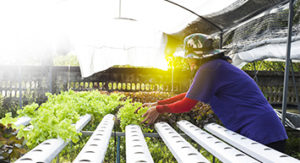
How does it work?
Fishes generate waste which is converted to fertilizer by microbes. Plants take up the nutrients from it for their growth and clean water returns to the fish. In other words, Aquaponics is the ideal answer to a fish farmer’s problem of disposing of nutrient-rich water and the hydroponic plant grower’s need for nutrient-rich water.
The Chief Advantages of Aquaponics
- The technique of Aquaponics yields more produce as it grows up to five times the plants in half the time as compared to conventional farming.
- It saves water as it uses only 10% of the water of traditional farming.
- The process can all be done in a fraction of the space. To put it in a nutshell, it requires less space.
- It facilitates the growth of completely organic fruits, vegetables and herbs.
- It generates more profits as it has multiple revenue streams in the form of fruits, vegetables and fish.
- The fish do all the hard work, so it becomes less laborious for humans.
- Aquaponics aids to grow foods that are non-native or usually out of season all year round. Hence, it fosters year-round production.
- The fish being reared in Aquaponic farms also act as an additional source of income for farmers.
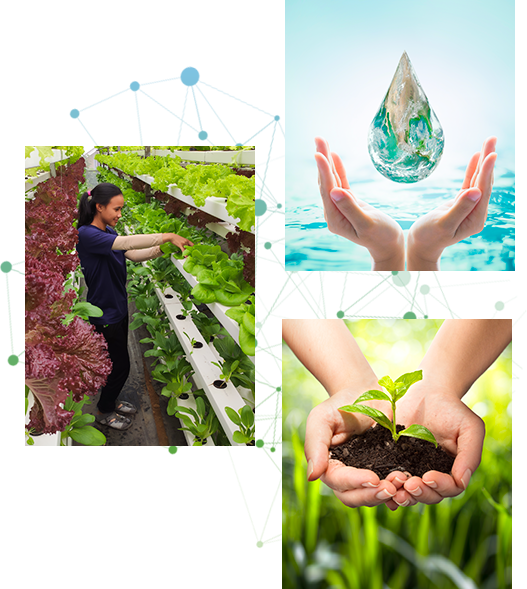
A Secure,
Sustainable Investment
Aquaponic is the ultimate sector disruptor, turning a people-intensive and weather susceptible industry on its head, and increasing yield for less resource, in terms of water, land and labour.
Aquaponics is the next best investment choice.
Aquaponics meets future food demands without depleting our natural resources or harming our environment, supporting United Nations Global Goals for a better future by 2030.
The demand for a variety of ingredients has grown considerably over recent years. There has never been a better time to invest in aquaponics: a proven resource in meeting the market demand for fresh and good quality organic produce.
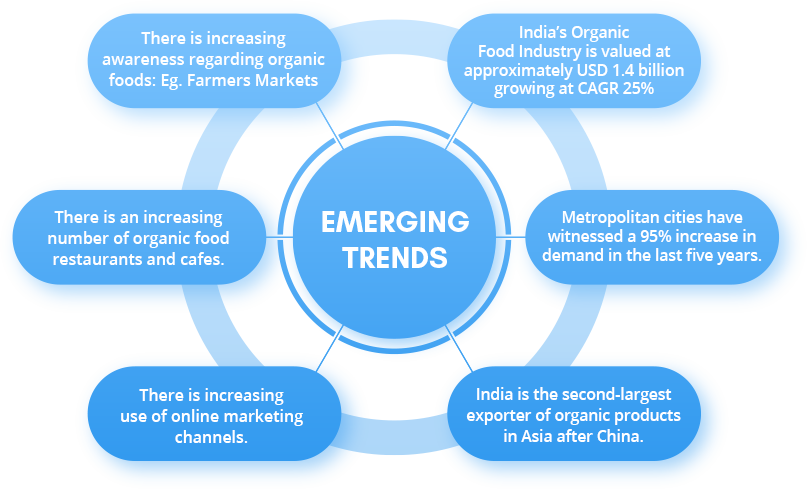
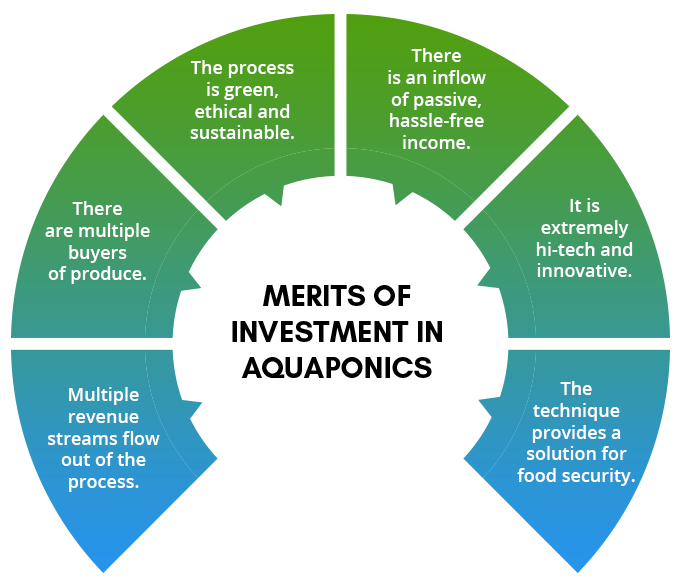
Social Proof

Lorem Ipsum
Lorem Ipsum is simply dummy text of the printing and typesetting industry. Lorem Ipsum has been the industry's standard dummy text ever since the 1500s, when an unknown printer took a galley of type and scrambled it to make a type specimen book.

Lorem Ipsum
Lorem Ipsum is simply dummy text of the printing and typesetting industry. Lorem Ipsum has been the industry's standard dummy text ever since the 1500s, when an unknown printer took a galley of type and scrambled it to make a type specimen book.

Lorem Ipsum
Lorem Ipsum is simply dummy text of the printing and typesetting industry. Lorem Ipsum has been the industry's standard dummy text ever since the 1500s, when an unknown printer took a galley of type and scrambled it to make a type specimen book.

Lorem Ipsum
Lorem Ipsum is simply dummy text of the printing and typesetting industry. Lorem Ipsum has been the industry's standard dummy text ever since the 1500s, when an unknown printer took a galley of type and scrambled it to make a type specimen book.

Lorem Ipsum
Lorem Ipsum is simply dummy text of the printing and typesetting industry. Lorem Ipsum has been the industry's standard dummy text ever since the 1500s, when an unknown printer took a galley of type and scrambled it to make a type specimen book.
Introduction Of
The Aquaponics Course
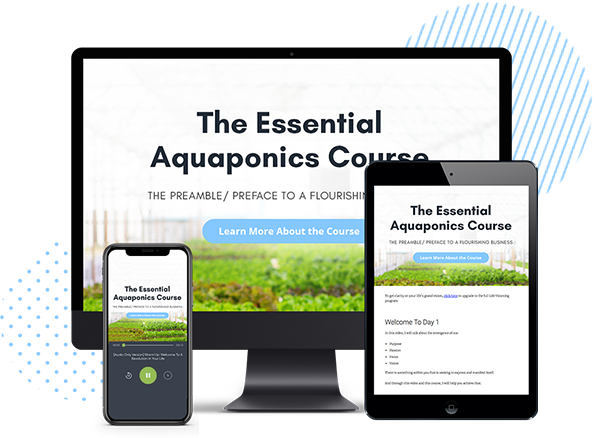
01
Essential components of a Deep Water Culture Unit
- Fish tanks – Learn how shape affects waste movement and explore different building materials
- Filtration – difference between mechanical and biological filters
- Hydroponic components and DWC grow canals
- Water movement and plumbing
- Aeration
- Tour a working farm and understand its design
02
Starting up you aquaponics farm
- System cycling and starting a biofilter colony
- Adding fish and plants during the cycling process and what to expect
03
Water quality in aquaponics
- Oxygen and how it is the life source of the system.
- What is ph and how it will determine if your plants are happy or starving !
- Manipulating ph
- The effects of temperature on the aquaponic system and all its living components.
- Total nitrogen: ammonia, nitrite and nitrate
- Understanding water hardness
- How algae and other parasites will affect your aquaponics system
04
Bacteria
- How to ensure a heathy colony of bacteria
- Understanding the biofilter
- Monitoring bacterial activity
- What is mineralization and which group of bacteria are responsible for it
- Unwanted bacteria and their types
Why This Course?
The course is designed for farming enthusiasts with or without a basic understanding of how Aquaponics works and for people who intend to enhance their knowledge of the science, the operations and the design process of building an Aquaponics farm, both in the backyard and on a small commercial scale. This course comprises study material and learnings derived not only from the experience of running a small commercial farm but also from academic research on the subject of Aquaponics conducted in the past two decades.
- Are you enthusiastic to master the key operational techniques of Aquaponics required to operate a backyard or a commercial size system?
- Get a solid understanding of how Aquaponics functions and how you can master all aspects of growing in Aquaponics.
- Are you tired of searching the internet for answers in so many different places?
There are several resources on the internet that will help you learn the basics of Aquaponics. However, in this course, we would delve deeper into the science behind Aquaponics, how to create an optimal environment for your symbiotic ecosystem, understand fish and fish husbandry so you can produce market-ready fish, plant nutrients and how to create an optimal balance so you could plant as well as fish growth, pest management and control, so you can protect your investment and finally we would put all this newly acquired knowledge into a case study that demonstrates to you exactly how to design a small commercial size Aquaponics system. Furthermore, you’ll also learn:-
- The components of a home or small commercial Deep Water Culture system
- How to properly design and arrange the various components of an aquaponic system in order to make it function properly.
- How to size any system to meet your hobby or commercial system needs.
- How to create the perfect balance between the fish, plants, and bacteria.
- How to take your system from the initial stage to the final stage without killing your fish and plants.
- How to properly maintain water quality.
- How to use testing instruments to understand your system better.
- How to remove solid waste and what to do with it.
- The types of bacteria in aquaponics and how to use them to your advantage.
- Fish and plants in aquaponics
This Course Is For
aquaponics farmers, organic farmers, gardeners, hobbyists, hydroponic farmers and organic growers respectively.
Instructors Profile
Sneh Shekhawat
is a dedicated pioneer in the budding arena of Aquaponics, as a technique for urban agriculture in her state of Rajasthan and in India as a whole, since the year 2015. She is extremely passionate about imparting the highly productive expertise of Aquaponics to mainstream farmers and has educated hundreds of prospective farmers through the medium of workshops and farm visits. Moreover, she co-founded “Aquaponics in India”, an online forum to teach and connect like-minded enthusiasts. It was a milestone in the journey she had fervently embarked upon a few years ago.


Himanshu Jakhar
Himanshu was raised in various locations around India but has now settled in Jaipur where his family have been commercial farmers for over 50 years. Having witnessed firsthand the ineffective and outdated methods and tools used on the majority of Indian farms, he is convinced that aquaponics is the future of food production. On his regular trips to our farm he is often accompanied by his faithful Labrador ‘Dude,’ who has to be kept a safe distance away from our fishtanks…
FAQ's
It generally takes students from one to two weeks to complete the course.
The study material on our platform can be accessed from both, your cell phone and computer.
The course material is available round the clock for students to access.
There are NO contracts or questions asked. The students are entitled to cancel up to XXX days.
The students must go through all video and reading material and pass all quizzes in order to successfully complete the course.
The course is for everyone who is looking for in-depth knowledge of how to turn their curiosity and passion for Aquaponics into a viable skill that can help them provide consistent food supply to their family and be used to launch a new career as a commercial farmer.
Payment Plan
18% Goods & Services Tax (GST) inclusive
For your security, all orders are processed on a secured server

